{title}
{publish}
{head}
One hundred years ago, on June 21, 1925, the Thanh Nien newspaper—founded by leader Nguyen Ai Quoc—published its first issue, marking the birth of the Vietnamese revolutionary press. Since that historic moment, the press has spent a century standing shoulder to shoulder with the Party and the nation, fulfilling its role as a core, pioneering force on the ideological and cultural front, and making tremendous contributions to national liberation, construction, defense, and development.

Central and local reporters at the site of the Phong Chau bridge collapse (September 2024).
A historic milestone
With the first issue of Thanh Nien in June 1925, a wave of revolutionary newspapers emerged across the country. Distributed by comrades and compatriots, these publications served as revolutionary manifestos, igniting the belief in national liberation, rallying the masses, fostering patriotism, building revolutionary forces, and mobilizing people to rise up and overthrow colonial and feudal regimes.
Following the success of the August Revolution, the press embraced the mission of “supporting righteousness and eliminating evil,” actively protecting the fledgling government of the Democratic Republic of Vietnam. During the wars against the French colonialists and the American imperialists—and in the defense of the Fatherland—the revolutionary press became a special combat force, advancing alongside the people in the quest for independence and national reunification.
In the era of national renewal, Vietnamese revolutionary journalism has consistently reaffirmed its role as a vanguard force on the ideological and cultural front. The press has actively promoted innovation, encouraged creative thinking, highlighted emerging models and exemplary individuals, and spread the spirit of emulation and productive labor across all social strata.
According to Professor Dr. Ta Ngoc Tan, Permanent Vice President of the Central Theoretical Council, the Vietnamese revolutionary press has remained loyal to its founding mission, becoming a powerful weapon in the struggle to overthrow French colonial rule, repel foreign invasions by the Japanese, French, and Americans, and build a free and independent Vietnam. Today, the press continues to serve the people in the cause of national development—writing glorious, proud chapters in the country’s modern history.
Beyond being a means of communication, the press also acts as a vital bridge between the Party, the State, and the people—between policies and everyday life. It plays an essential role in guiding public opinion and building social consensus.
Professor Dr. Nguyen Xuan Thang—Politburo member, President of the Ho Chi Minh National Academy of Politics, and Chairman of the Central Theoretical Council—affirmed, “With an objective and multi-dimensional approach, the press has truthfully and vividly reflected social life in all regions of the country. It has promptly highlighted pressing issues—poverty reduction, environmental protection, education, healthcare, social security, administrative reform, anti-corruption, waste, and other forms of misconduct. The press plays a supervisory and critical role, identifying bottlenecks in policy implementation, proposing appropriate solutions, and helping the Party and State adjust and improve laws and institutions.”
Vietnam currently has more than 40,000 people working in the press sector, including over 23,000 accredited journalists and 797 press agencies. Each year, these agencies produce around 40 million news articles, a figure that multiplies tenfold in cyberspace. The press also generates 20,000 hours of radio and 50,000 hours of television content annually. Notably, around 20% of press coverage focuses on policy communication.
Speaking at the national scientific conference “100 Years of Vietnamese Revolutionary Journalism Accompanying the Glorious Cause of the Party and the Nation,” Mr. Tran Cam Tu—Politburo member and permanent member of the Secretariat—emphasized, “Over the past 100 years, Vietnamese revolutionary journalism has achieved remarkable growth in quantity, quality, and content. It has begun mastering modern communication technologies. Many press agencies have evolved into multimedia platforms on par with regional and global standards. Our team of journalists is politically steadfast, professionally competent, ethically grounded, and fully committed to social responsibility.”

Building a professional, modern press in the homeland
The Resolution of the 13th National Party Congress clearly defines the goal: “To build a professional, humane, and modern press and media system.” The resolution emphasizes press planning and development, restructuring the publishing, printing, and distribution industry towards streamlining, quality, and modernization. It also stresses the need to strengthen oversight and development of online media and to resolutely combat and eliminate toxic, misleading, and reactionary content that threatens political and social stability, customs, and traditions.
Implementing this resolution, the press in Dat To (Phu Tho province) has made significant strides—not only in content, format, and operations, but also in affirming its role and position in public life.
In addition to its three provincial press agencies, Phu Tho is home to the Military Zone 2 Newspaper and has 25 central press agencies maintaining representative offices and resident reporters in the province. Each year, Phu Tho welcomes over 1,000 central press reporters, who collectively publish more than 6,000 articles and programs reflecting political events, Party and government leadership, socio-economic achievements, strategic breakthroughs, and the province’s potential and strengths.
Mr. Vu Xuan Chuong—Member of the Central Committee of the Vietnam Journalists Association, Deputy Editor-in-Chief of Phu Tho Newspaper and Radio-Television Station, and Chairman of the Provincial Journalists Association—noted: “Throughout its development, the press in Dat To has not only advanced in content and form but has also firmly established its role in society. Amid the Fourth Industrial Revolution, local press agencies have turned challenges into opportunities—successfully implementing digital transformation and establishing themselves as multi-platform, multimedia outlets that best serve the public and contribute meaningfully to the province’s socio-economic progress.”
Mr. Vi Manh Hung—Member of the Provincial Party Standing Committee, Head of the Propaganda and Mass Mobilization Department, and Editor-in-Chief of Phu Tho Newspaper and Radio-Television Station—also affirmed, “Phu Tho now boasts all forms of press. Our local press agencies operate in line with their mandates and are developing into multimedia convergence platforms, firmly establishing their position in society.”
He stressed that, in the context of administrative restructuring and the streamlining of local government at two levels, the press plays a crucial role as a communication bridge. It conveys policies and decisions, helping Party members, officials, and citizens understand the goals, significance, and outcomes—thereby building public consensus and ensuring the successful implementation of national reforms.
In harmony with the 100-year journey of Vietnamese revolutionary journalism, press agencies across the homeland are embracing reform and restructuring in a leaner, stronger, and more innovative direction. They are determined to make bold, creative strides—elevating the press in step with the nation’s progress in the new era.
Journalists uphold the spirit of a “sharp pen, pure heart, and clear mind,” deeply committed to serving the nation and the people. In particular, the press is focusing on political education and communication in preparation for the upcoming party congresses at all levels—culminating in the 14th National Congress of the Communist Party of Vietnam.
Chi Huong
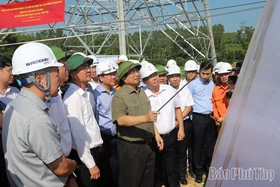
baophutho.vn On the morning of August 9, a working delegation led by Comrade Pham Minh Chinh, Politburo Member and Prime Minister, visited and worked in Phu...
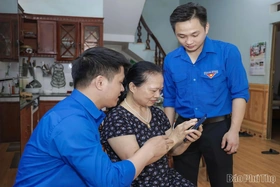
baophutho.vn Phu Tho Province has consistently prioritized the identification, development, and replication of exemplary models in studying and following...
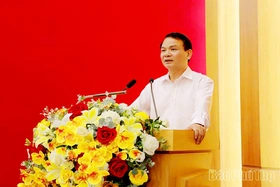
baophutho.vn On the afternoon of August 8, the Provincial Party Executive Committee held its second conference of the 2020–2025 term to implement personnel...
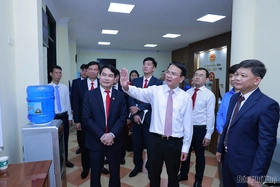
baophutho.vn After one month of implementing the two-tier local government model, thanks to careful, scientific, and well-coordinated preparation—and a...
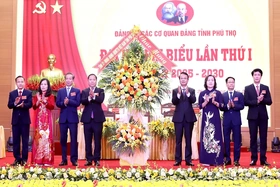
baophutho.vn As of July 31, the last grassroots-level Party organizations in Phu Tho had successfully held their congresses for the 2025–2030 term, making...
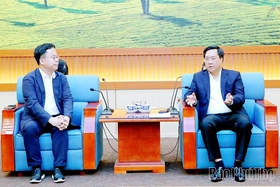
baophutho.vn On the morning of August 1, Mr. Tran Duy Dong – Deputy Secretary of the Provincial Party Committee and Chairman of the Phu Tho People’s...

baophutho.vn On July 30–31, at the Provincial Conference Center, the Party Committee of the Phu Tho Provincial People’s Committee solemnly held its 1st...
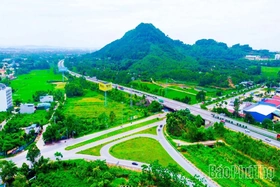
baophutho.vn The merger has given rise to a new Phu Tho Province, not merely through the expansion of administrative boundaries, but more profoundly,...

baophutho.vn On the morning of July 26, in commemoration of the 78th anniversary of War Invalids and Martyrs Day (July 27, 1947–2025), Mr. Tran Duy Dong,...

baophutho.vn On July 26, on the occasion of the 78th anniversary of War Invalids and Martyrs Day (July 27, 1947–2025), Mr. Dang Xuan Phong, Member of the...

baophutho.vn Looking back on its century-long history, Vietnam has actively participated in and strictly adhered to international commitments on freedom of...

baophutho.vn On June 18, in Phu Tho province, the People’s Committees of Phu Tho, Vinh Phuc, and Hoa Binh jointly organized a workshop to gather feedback on...